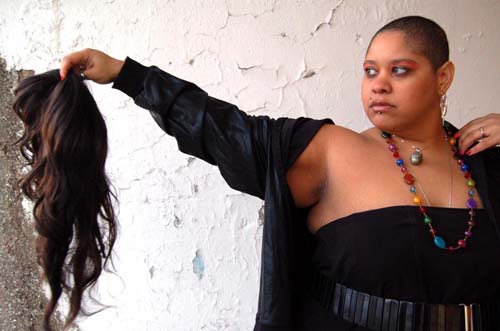Nikki Patin is a Chicago-born performance artist and activist, who has appeared on HBO’s Def Jam. Her work combines burlesque, spoken word and music to address the themes of body image, race and class. Patin will be touring New Zealand and Australia from the end of February through April, and is hosting a series of fundraisers in town to pay for the upcoming trip. She will be signing copies of her book “The Phat Grrrl Diaries” at these events. Windy City Times spoke to Patin.

Windy City Times: Could you talk about your work and its combination of elements like burlesque and spoken word?
Nikki Patin: Body image has been the major focus of my work. I’m a bigger girl, and to do burlesque in a bigger body is really political for a lot of people. My show is about a broader range of body image, not just in terms of size but in terms of skin color, class, religion, ancestry, ethnicity, nationality. It’s about how body image can impact action and how action can impact image. You don’t have to exist within a narrow range of expectations. I’m a big girl and I’m a big fan of Prince, pop culture and erotic literature so it’s a combination of my love for the poppy, dance-y side of life, but also my acknowledgment of reality and how I see the world.
WCT: What do you mean by the political aspect of the work?
NP: I reveal a lot of flesh, for someone with a body type that most people would cover up. For me, as a bigger girl, one of my biggest fears was being naked in front of people. To conquer that is really powerful, for me personally. For other people who see that, it’s something brave and bold. That wasn’t a reaction I anticipated. It’s been overwhelmingly positive. I think they like the honesty of it.
WCT: There’s been a lot of cultural discourse around the concept of phat/fat bodies, over the last decade or so. That has emerged both from performance artists like Nomy Lamm but also in the more conventionally “popular” culture works of people like Monique. Has the moment when fat/phat bodies were a subject of cultural production and discourse largely disappeared or become something else?
NP: Maybe it has. For me, I think of balance. I just don’t see many bigger women out there. Typically, I’m the biggest person in the room in whatever show I perform in. What’s problematic is that we’re perceiving fatness as a specific genre of performance. In actuality, if the oppression around it didn’t exist, it would just be woven in. Just like anything else. We have a balance of men and women, blacks and whites, Christian and Muslim performers—they’re woven into the texture of performance because we’re looking at the story of humanity. I don’t think issues around fatness/phatness and body are past their time because I don’t see many fat people who feel like they have agency or access to the stage. For me, performatively, that means there’s something missing.
WCT: In terms of your New Zealand/Australia tour, do you think that the concept of body image and related issues will translate in the same way? Those would seem to operate in a culturally specific way in the United States.
NP: I’ve been thinking about that this past month, especially because there are a lot of cultural references to being Black, and to being queer and a lot of Chicago references. I’ve settled on not really having any expectations about it, and thinking about it just in terms of presenting my story. It just so happens that these issues have framed my existence. I speak to that. I’m really blessed to have sixty minute shows on the tour. That’s a nice amount of time to get to know an audience and for them to know me. I’m pretty excited about it.
WCT: What are you most excited about, in terms of this tour?
NP: I’m looking forward to growing more comfortable on stage and growing up as a person. And the experience of traveling alone, and seeing what life is really like in another part of the world.